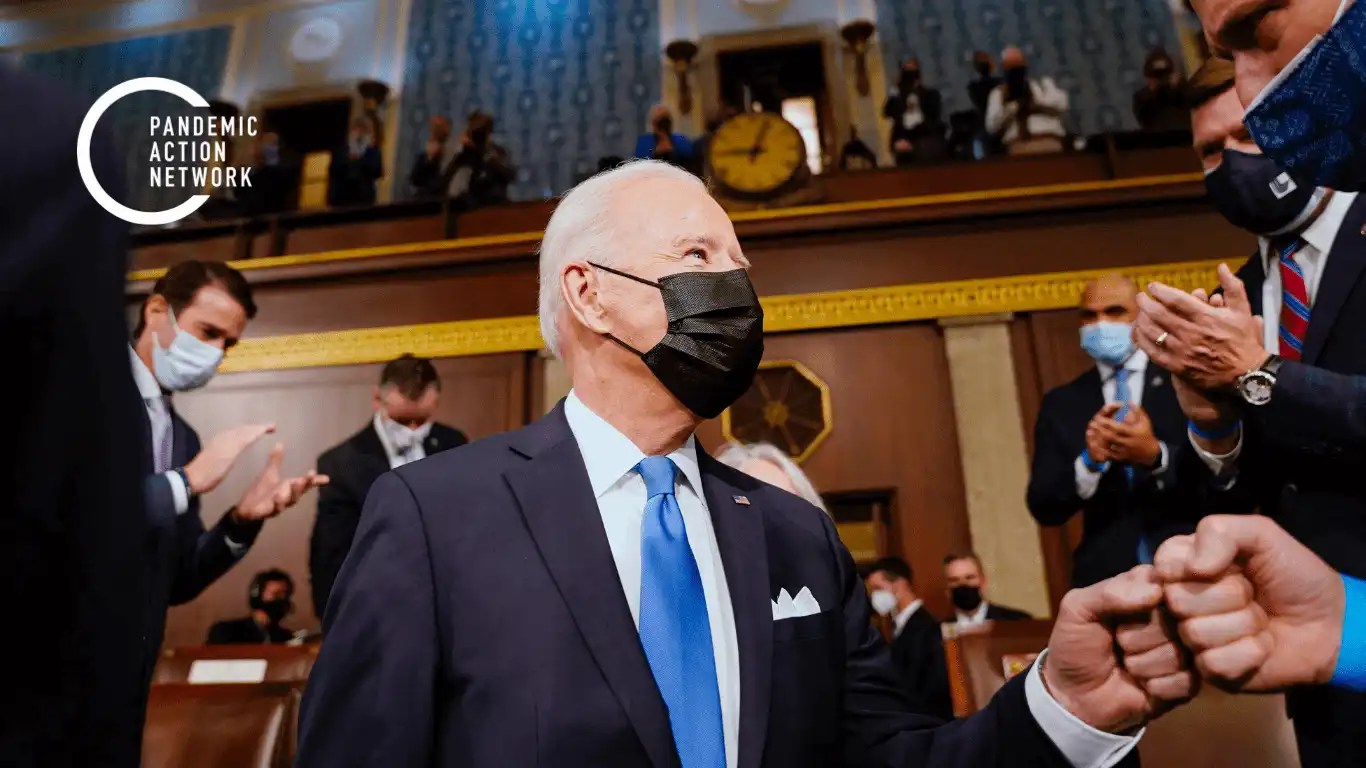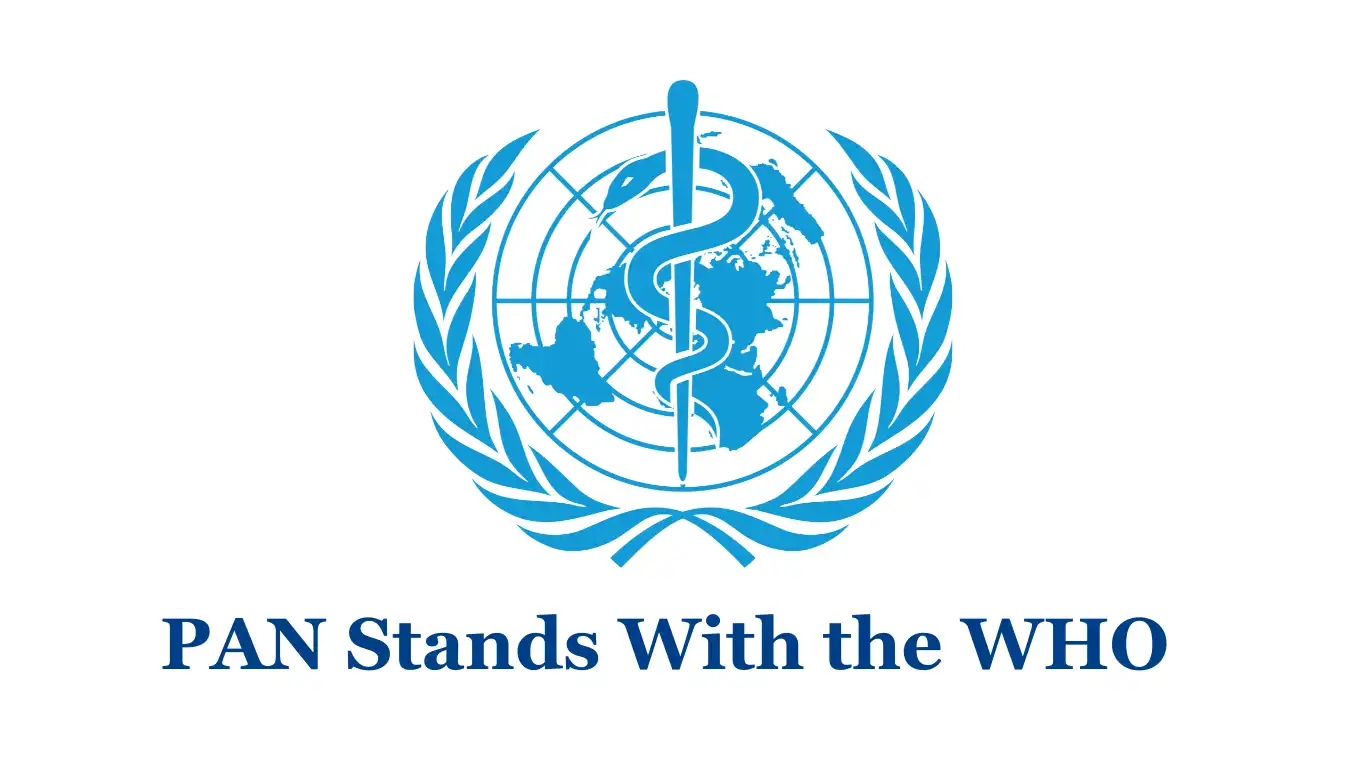Carolyn Reynolds, Co-founder & Courtney Carson, Senior Program Officer, Pandemic Action Network
The COVID-19 pandemic has overshadowed almost every aspect of President Biden’s first 100 days in office. During the transition, the Pandemic Action Network and leading global health experts called on then-President-elect Biden to take bold steps and work with Congress and with world leaders to end the pandemic as soon as possible and ensure we are better prepared for the next one.
So how has the Biden-Harris Administration done so far, and what remains to be done?
Prioritizing the threat: Right out of the gate, President Biden made a series of welcome announcements to prioritize pandemic response both at home and abroad.
- On his first day in office, he signed a new Executive Order to organize and mobilize the U.S. government to provide an effective COVID-19 response and renew U.S. leadership on global health security.
- On day two, he issued his first National Security Memorandum on U.S. Global Leadership to Strengthen the International COVID-19 Response and Advance Global Health Security and Biological Preparedness (NSM1) — firmly placing pandemic response and preparedness as a top national security priority, where it belongs — along with an Executive Order on Ensuring a Data-Driven Response to COVID-19 and Future High-Consequence Public Health Threats.
These early announcements included reversing the politically-motivated decision last year to initiate U.S. withdrawal from the World Health Organization (WHO). Instead the Biden-Harris Administration has leaned in to bolster the WHO and the international response to this crisis. Notably, Vice President Kamala Harris’s first conversation as VP with a global leader was with WHO Director-General Dr. Tedros.
COVID-19 response: President Biden has shown leadership by wearing a mask consistently in public, and by issuing a universal mask mandate for all federal buildings, public transportation, and transportation hubs. This cemented the science-backed recommendation that wearing a mask is a key preventative measure. In addition, his first major legislative package, the $1.9 trillion American Rescue Plan Act (ARPA), provided urgently needed relief to families, states, and communities grappling with the economic, social, and health impacts of COVID-19, and accelerated the frontline pandemic response both at home and abroad. Despite some early challenges, the domestic vaccine rollout has accelerated in Biden’s first 100 days, with 235 million vaccines administered and 98 million people fully vaccinated as of today, according to the CDC. Despite these efforts, vaccination rates are now slowing — a worrying trend as vaccines skepticism grows across the U.S.
On the global response front, the Biden Administration has also taken some important steps, namely to commit a total of $7.5 billion to date to the Access to COVID-19 Tools Accelerator (ACT-A) partnership and its COVAX financing facility to ramp up access to vaccines and other lifesaving tools around the world. As a result, the U.S. is now the leading donor to this global solidarity effort. Highlighting its commitment to the global response, the U.S. hosted international leaders to kick off a virtual resource mobilization campaign for COVAX, urging other wealthy nations to contribute. It also announced agreements to loan vaccine doses to Canada and Mexico, and to provide relief and vaccine donations to India, including mobilizing the U.S. military to provide emergency aid in the face of the country’s growing COVID-19 crisis.
Pandemic preparedness: U.S. leadership is also needed to strengthen systems for pandemic preparedness, at home and abroad. Pandemic Action Network continues to urge President Biden and other world leaders to lay the groundwork for a pandemic-proof America and world now — before the pandemic fades from view and political and public attention shifts to other priorities, as it has too many times before.
Here again, the Biden-Harris Administration has laid down some important early markers. First at home: The American Jobs Plan includes a serious commitment of $30 billion to bolster prevent future pandemics and protect against a range of biological threats. This represents renewed and increased commitment to bolstering research and development, surveillance, and strategic stockpiles to ensure America is ready to respond to future disease threats.
On the global front, President Biden is leading a push for new sustainable financing to help all countries be prepared to counter pandemic threats. Pandemic Action Network is pleased that in NSM1 and several follow-on announcements, the Biden-Harris Administration has expressed its intent to heed our call to establish an enduring international catalytic financing mechanism for preparedness, with the aim to ensure that every country has the core capacity it needs to detect, prevent, and respond to outbreaks at their source before they become deadly and costly pandemics like COVID-19. Earlier this week, Vice President Harris urged representatives at the United Nations to work together now to prepare for the next pandemic. The Administration’s initial budget proposal for FY22 released April 9 backs up these pledges with a $1 billion increase in funding for global health security.
Looking Ahead: This progress in President Biden’s first 100 days is a welcome start. But much more must be done, and urgently — as the pandemic continues to rage around the world and as the next pandemic threat is looming. Pandemic Action Network has issued an Agenda for Action for world leaders. U.S. support will be critical to drive progress in all of these areas, but here are three where the Biden-Harris Administration can and should lead the way now:
- Expanded global vaccine access is vital to ending this pandemic. According to the Launch and Scale Faster initiative at Duke University, the U.S. has secured at least 500 million more doses than it needs to vaccinate every American, while some of the poorest nations have yet to receive a single dose. Given U.S. success in vaccination — and the threat to the U.S. of the continued spread of COVID-19 and its variants in other parts of the globe — the Biden-Harris Administration should lead the way to immediately share more excess doses with the world through COVAX. In his first address to Congress, President Biden committed to sharing vaccines with the world once the U.S. has amassed additional supply and when all Americans have access to COVID-19 vaccine. We are there, and we will not end this pandemic if we continue to allow other countries to go unserved. And President Biden should also work with world leaders to agree on a Global COVID-19 Vaccine Roadmap to reach at least 70% global vaccine coverage as soon as possible.
- Mobilize additional domestic and international funding for preparedness on par with the threat. To this end, we urge the U.S. to build on its commitment to establish a global financing mechanism for pandemic preparedness with a pledge of at least $2 billion to start, and call on other G7 and G20 member countries to join the U.S. and invest in this effort toward an initial capitalization of $20 billion this year. Separately, the U.S. should also commit a multi-year pledge toward fully funding the five-year plan of action for the Coalition for Epidemic Preparedness Innovations (CEPI). CEPI is playing a critical role in accelerating global access to vaccines in this crisis, and has set a bold goal to compress the future timeline to develop new vaccines for emerging pandemic threats so that they can be quickly developed, tested, and rolled out in an emergency. This is the kind of ambition the world needs, and the U.S. must do its fair share to advance this global public good.
- Fix the global pandemic defense system. While new and dedicated funding for preparedness is absolutely critical, it’s not the only piece of the puzzle. The COVID-19 crisis has shown that we must strengthen our international instruments of leadership and accountability to ensure both better preparedness and more rapid response to potential pandemics. This includes strengthening our existing global mechanisms such as the WHO and International Health Regulations, but also seriously entertaining bold and new modalities and frameworks for pandemic governance, such as the proposal for a new pandemic treaty, which now has the backing of dozens of other world leaders. President Biden convened world leaders last week on climate change to push for bold solutions; pandemic threats deserve the same level of political priority.
The next few months will see a series of global summits and convenings, offering world leaders multiple opportunities to seize the moment and take action. Pandemic Action Network urges President Biden and his Administration to seize these opportunities, doubling down on the progress of the first 100 days and going bigger and bolder on ending this pandemic and preventing the next. While progress since January 20 has been meaningful, the costs of the U.S. and the world failing to act sooner continue to mount — and the pandemic is far from over. Now is the time for a step change in the ambition of the U.S. and global leaders to do what it will take to end this pandemic for everyone, and ensure that COVID-19 leaves a long-term legacy of a pandemic-proof world.



